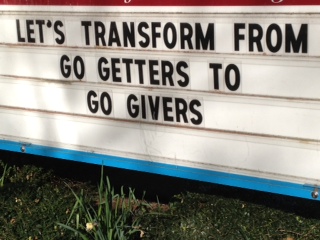
Pronoia: “The delusional belief that other people are plotting your well-being or saying nice things about you behind your back”
One of the books I enjoyed reading this summer was Give and Take by Adam Grant.
I first learned about Grant, and his book, in this New York Times piece, Is Giving the Secret to Getting Ahead?.
In the book, Grant talks about givers, takes, and matchers—people who primarily give of themselves, people who primarily take from others, and people who seek to give and take in equal amounts.
Givers, we learn, are most likely to land at the bottom—and the top—of the success letter. The key is learning to harness the benefits of giving while minimizing the costs.
It takes time for givers to build goodwill and trust, but eventually they establish reputations and relationships that enhance their success (and give them a healthy dose of pronoia—see definition above.) Being a giver is not good for a 100-yard dash, but it’s valuable in a marathon.
Giving can boost happiness and meaning. Grant tells of a study where people received $20 they had to spend by 5:00pm the same day. Most people think they would be happier spending the money on themselves, but the study showed the opposite to be true: if you spend the money on yourself, your happiness doesn’t change, but if you spend money on others, you become significantly happier.
When concern for others is coupled with a healthy dose of concern for the self, givers are less prone to burnout. Grant calls this “otherish giving”, as opposed to “selfless giving”. Otherish givers may appear less altruistic than selfless givers, but their resilience against burnout enables them to contribute more.
As more people find themselves working in teams, givers will have more opportunities to demonstrate their value. Also, as the service sector continues to expand, there’s more value to having a reputation as a giver.
Grant also discusses that when you change people’s behaviors, their attitudes often follow. Studies of volunteering show that even when people join a volunteer organization to advance their own careers, the longer they serve and the more time they give, the more they begin to view the volunteering role as an important aspect of their identities.
Best regards,
David
What are your experiences? Join the conversation with your comments…
